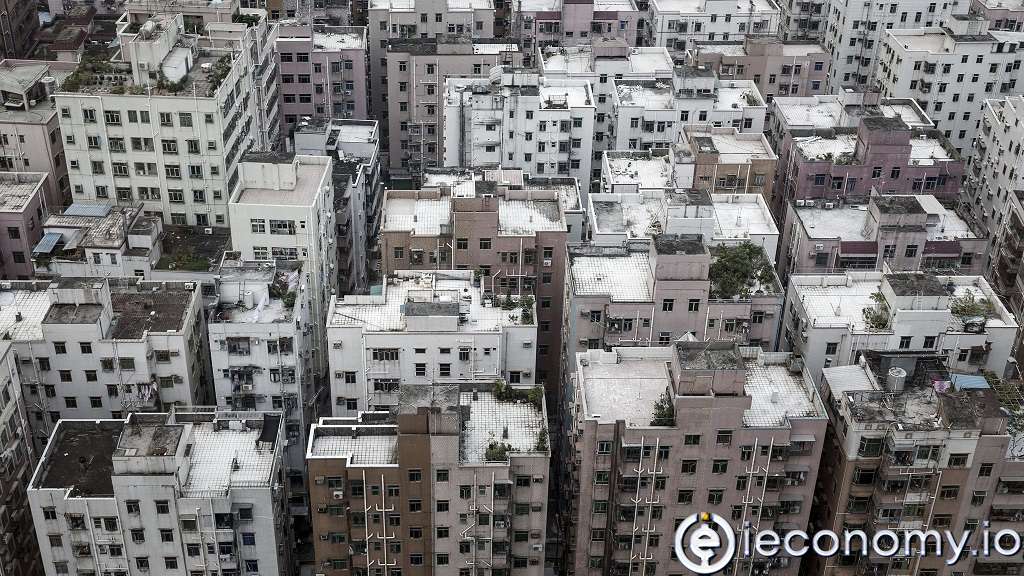The downpayment decision that created a rally in real estate in China
While the Evergrande crisis in China caused great damage to the real estate sector, a decision that created a movement for real estate...

Yayınlanma: 19 Şubat 2022 05:00
Güncellenme: 12 Şubat 2026 02:13
Consumer inflation is tangent to the world's second and third largest economies, so to speak.
In Japan, the core consumer price index rose 0.2 percent last month, further away from the Bank of Japan's (BOJ) target of 2 percent. On the other hand, energy prices climbed at the fastest pace in the last 41 years, reaching 17.9 percent.
Consumer prices increased by 0.9 percent in China last month.
Loan costs in China did not ease despite the interest rate cut
Despite the rate cut and credit expansion last month, borrowing costs in Chinese money markets did not ease.
This morning, overnight repo rates in the interbank market jumped 25 basis points to 2.11 percent. The bounce, which indicates the tightness in liquidity conditions, was the hardest in the last 3 weeks. Analysts point out that when the world was tightening, China relaxed its money valves, but acted very cautiously while doing this.
The People's Bank of China (PBOC) announced 5 or 10 basis point cuts in various interest rate instruments last month.
The decision that created a rally in the real estate industry in China
A glimmer of hope has emerged for real estate companies in China, whose sales revenues have been shrinking rapidly since the Evergrande crisis.
In the city of Heze, which has a population of 9 million in Shandong province, large banks have reduced their housing loan prepayment rates from 30 percent to 20 percent. The fact that the central government's interest rate, which has been kept high to prevent a bubble in housing prices, has been lowered in a city for the first time since 2016, has led to a rally in real estate shares. Investors think that other cities can follow Heze's example.
The share of the real estate sector in the Chinese economy, which is expected to generate 19 trillion dollars in revenue this year, is close to 30 percent together with the subsidiary sector.
Regulation in technology does not fall off the agenda
The regulatory ordeal of technology giants such as Alibaba, Tencent, and Meituan is endless.
The NDRC, which serves as the state planning agency in China, asked platforms that provide food ordering services online to reduce delivery fees. With the announcement, Meituan shares fell as much as 11 percent in Hong Kong. Alibaba shares also fell 4 percent before closing.
China-based technology giants have been trying to cope with regulation or restriction moves from both Beijing and Washington for more than a year.
Election poll effect on nuclear stocks in South Korea
Nuclear energy shares in South Korea rose sharply after the opposition leader opened the gap in the election poll.
As the world grapples with heavy energy bills, nuclear power plants have been at the center of the electoral race in South Korea in recent months. After the intensifying public debates, the survey results announced today led to a rally in the sector's stocks. Kepco Engineering saw premiums of 14 percent, Korea Electronic Power 9.7 percent, and Doosan Heavy 8.9 percent.
According to the Gallup poll, opposition candidate Yoon Suk-yeol, who advocated more reactor construction, seems to have increased the vote gap to 7 points with his opponent.
Fertilizer risk in Asia
Fertilizer industries in Asia's populous agricultural countries are assessing the risk of potassium compounds rising amid Ukraine tensions.
The shares of Russia and Belarus in the supply of potassium compounds are at the levels of 20 and 17 percent, respectively. Asian countries, which are trying to cope with the rise in fertilizer prices, are worried that possible sanctions against Russia due to Ukraine will create a supply shock in this area. In the world's most populous countries, such as China, Indonesia, and India, the dose of anxiety is greater.
Lithium signature from Tesla
As competition intensifies in the electric vehicle market, Musk's mining hunt in Australia, which has increased concerns about lithium supply, has yielded results.
Tesla signed a 5-year direct supply agreement with Liontown Resources to supply lithium from the Western Australia region. With the agreement, after 2025, 150 thousand tons of concentrated lithium will be on the way to battery factories for Tesla vehicles every year.
Rapid rise in lithium prices
The increase in lithium prices reached 600 percent in the spot market.
Meanwhile, the extreme rise in lithium prices continues. The increase in Chinese prices, which is an indicator, has exceeded 40 percent since the beginning of the year, and yesterday it found buyers for 430,000 yuan, approximately 67 thousand dollars per ton in the spot market.
Lithium carbonate prices were below $10,000 a year ago. According to the report published by Citi, if the current levels are permanent, there may be an increase of up to $1,000 in the battery costs of electric vehicle manufacturers.




